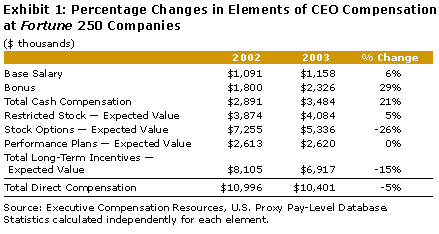
TDC is composed of salary, bonus and long-term incentives (LTIs), which include stock options, restricted stock and long-term performance awards. The value of stock options is calculated using the Black-Scholes valuation model.
August 2004
Major Shift Under Way in CEO Pay Packages
Large corporations are changing how they pay their CEOs — scaling back the use of stock options and stepping up reliance on restricted stock and long-term performance awards — according to a Towers Perrin report.
The analysis, which examined compensation for CEOs at 197 publicly traded Fortune 250 companies that had filed their fiscal year 2003 proxy statements by May 10, 2004, seems to confirm that the days of extraordinary long-term incentive packages composed primarily of stock options are over. To ensure valid year-to-year comparisons, only CEOs who have held their position for the past two years were included in the analysis.
The study found that total direct compensation (TDC) paid to CEOs in
fiscal 2003 actually fell 5% on average to $10.4 million.

TDC is composed of salary, bonus and long-term
incentives (LTIs), which include stock options, restricted stock and
long-term performance awards. The value of stock options is calculated
using the Black-Scholes valuation model.
Total LTI compensation for CEOs in our study declined 15% on average, with the highest-paying companies showing the largest decreases. LTI values declined 17% at the 90th percentile and 10% at the 75th percentile. By contrast, values at the 10th, 25th and 50th percentiles all showed increases.
A significant decline in the expected value and use of stock options fueled the decline in total LTI values. First, fewer companies used stock options to compensate their CEO in 2003. Seventy-eight percent of companies granted stock options to their CEO in 2003, down from 84% in 2002.
Second, and more significantly, stock option expected values decreased. For those companies awarding stock options, the average value in 2003 stood at $5.3 million, with a median value of $4.1 million. Those numbers represent a 26% drop at the average and a 14% drop at the median from expected values at companies awarding stock options in 2002. The drop in stock option expected values occurred across the board, among companies of all sizes.
Other major findings
Here are other highlights of the Towers
Perrin analysis:
While companies are decreasing their reliance on stock options, they
are ramping up their use of restricted stock and long-term performance
awards.
Eighty-five of our study companies granted restricted
stock to their CEO in 2003, a sharp increase from the previous year. Of
those companies granting restricted stock in 2003, roughly half (42) did
not make a grant in 2002. Nineteen companies granted restricted stock to
their CEO in 2002, but not in 2003.
Values of restricted stock awards increased.
The median value
of restricted stock awards made in 2003 represented a 29% increase over
the median value of awards made in 2002, with awards at the average
showing a 5% increase over 2002. Of those companies granting restricted
stock in both years, the average value increased 33%, while the median
value increased 43%.
Long-term performance awards gained in
popularity.
Seventy-four study companies made long-term performance
awards to their CEO in 2003, up 21% from 2002. Of those companies, 20 did
not make a long-term performance award to their CEO in 2002. Seven
companies made awards in 2002, but not in 2003. The average value of
long-term performance awards also showed some increase, although
considerably less than restricted stock.
Cash compensation marches on and is becoming a larger part of an
average CEOfs pay package.
Average salaries for CEOs in our study
increased 6% in 2003, to $1.16 million. Fifty-five percent of study
companies paid their CEO a salary greater than $1 million in 2003, a 21%
increase over the number of companies paying in that range in 2002.
Bonuses took an even larger leap, jumping 29% at the average and 33% at
the median.
Revised pay formulas
Companies are remixing both their LTI
and their total pay packages. On average, the expected value of stock
options comprised 61% of a CEOfs long-term incentive pay in 2003 — still a
substantial piece of the pie, but a significant decrease from 75% in 2002.
Restricted stock and long-term performance awards, by contrast, are on the rise. Restricted stock awards accounted for 25% of an average CEOfs LTI pay in 2003, compared to just 15% in 2002. And long-term performance awards made up 14% of the package in 2003, compared to just 10% in 2002.
In terms of total compensation, stock options continue to make up the largest part of a CEOfs pay package, but were significantly less of the pay package in 2003 than in 2002. By contrast, base salary, annual bonuses, restricted stock and long-term performance awards all accounted for a greater share of total pay in 2003. More specifically, the study found:
From a cash versus LTI perspective, while long-term incentives still comprise the lionfs share of a CEOfs pay package, cash played a bigger role as a reward mechanism in 2003. Cash constituted 33% of an average CEOfs total pay package, a substantial increase from 26% in 2002.
Copyright © 2004 Towers Perrin. All rights reserved.